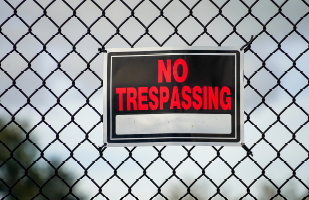Invited Apartment Complex Visitor Could Not Be Convicted of Trespassing

Landlords cannot have visitors prosecuted as trespassers when tenants invite the visitors.

Landlords cannot have visitors prosecuted as trespassers when tenants invite the visitors.
A landlord or property manager cannot exclude a visitor to a rented premise and seek to have the person prosecuted as a trespasser when the tenant invited the visitor, the Supreme Court of Ohio ruled today.
In a unanimous decision, the Supreme Court noted that generally, landlords cannot have invited visitors declared trespassers but can add provisions to lease agreements giving them that authority. The decision affirmed a Sixth District Court of Appeals ruling to overturn a Toledo man’s 2021 trespassing conviction.
Writing for the Court, Justice Patrick F. Fischer explained that under state law, a tenant, not the landlord, can declare someone on the property as a trespasser because the tenant has a “possessory interest” in the leased property. However, by making it part of the lease agreement, a landlord has the right to reserve the authority to prosecute those banned from the property.
Nephew of Tenant Contested Conviction
In 2020, the property manager of the Greenbelt Place Apartments in Toledo banned Antonio Randolph from the apartment complex. Later that year, the property manager responded to a noise complaint regarding the apartment leased by Randolph’s uncle. The property manager found Randolph in his uncle’s apartment and called the Toledo police. Randolph was charged with trespassing under R.C. 2911.21.
Randolph testified in Toledo Municipal Court that his uncle invited him to the apartment. Prosecutors for the city did not provide evidence that the lease signed by Randolph’s uncle authorized the property owner or manager to exclude anyone from the premises. The trial court found Randolph guilty, and he was sentenced to 30 days in jail, which was suspended, and ordered to pay court costs.
Randolph appealed his sentence to the Sixth District. The Sixth District noted the trial court was persuaded by a 2012 Second District Court of Appeals decision. In State v. Smith, the Second District found that the lease agreement for a rental unit does not prevent the landlord from excluding others from the premises because the landlord has a duty to ensure the quiet enjoyment of the premises by the tenants of the neighboring units.
The Sixth District noted that its decision conflicted with the Second District. The city of Toledo appealed the Sixth District’s decision to vacate Randolph’s conviction to the Supreme Court. The Court agreed to consider Randolph’s case and the conflict among appellate courts.
Supreme Court Analyzed Trespassing Laws
R.C. 2911.21(A) states that no person “without privilege to do so” shall knowingly enter and remain on the land or premises of another. Justice Fischer explained that R.C. 2901.01(A)(12) defines “privilege” as an immunity, license, or right conferred by law and “bestowed by express or implied grant.”
The opinion noted that the Sixth District surveyed the actions of other appellate courts regarding criminal trespassing convictions for tenants invited onto the property.
The Sixth District referenced a 1996 Eleventh District case, in which the Eleventh District explained that trespassing is “the invasion of the possessory interest” in a property. The Court noted that landlords sacrifice their possessory interests to their tenants when renting property and cannot prohibit a tenant from inviting others onto the property. The tenant, not the landlord, is in possession and can declare a person to be a trespasser, the opinion explained.
However, in some cases, lower courts have allowed a banned person to be convicted as a trespasser. The Court noted a Second District 2004 decision in State v. Scott, where a man was convicted of criminal trespass for visiting an apartment at the invitation of his girlfriend. The apartment complex was owned by the Dayton Metropolitan Housing Authority. The man had been notified previously that he could not enter the housing authority’s premises. In this case, the girlfriend signed a lease stating she agreed to abide by the housing authority rules, which had a provision allowing the agency to declare certain visitors as trespassers.
The Supreme Court concluded state law gives the right to declare a visitor as a trespasser to those with a possessory interest in a property. When it comes to guests, whether the tenant or the landlord has possessory interest depends on the lease agreement, the opinion noted.
The right to exclude visitors belongs to the tenant unless the lease agreements reserve the landlord’s right to ban certain guests, the Court concluded.
However, the opinion noted that landlords can protect the entire premises from disruptive visitors by acting against the tenant, not the visitor. The Court stated that a lease agreement can permit the eviction of a tenant who violates the other tenants’ right to quiet enjoyment.
2022-1082. State v. Randolph, Slip Opinion No. 2023-Ohio-4753.
 View oral argument video of this case.
View oral argument video of this case.
Please note: Opinion summaries are prepared by the Office of Public Information for the general public and news media. Opinion summaries are not prepared for every opinion, but only for noteworthy cases. Opinion summaries are not to be considered as official headnotes or syllabi of court opinions. The full text of this and other court opinions are available online.
Acrobat Reader is a trademark of Adobe Systems Incorporated.


